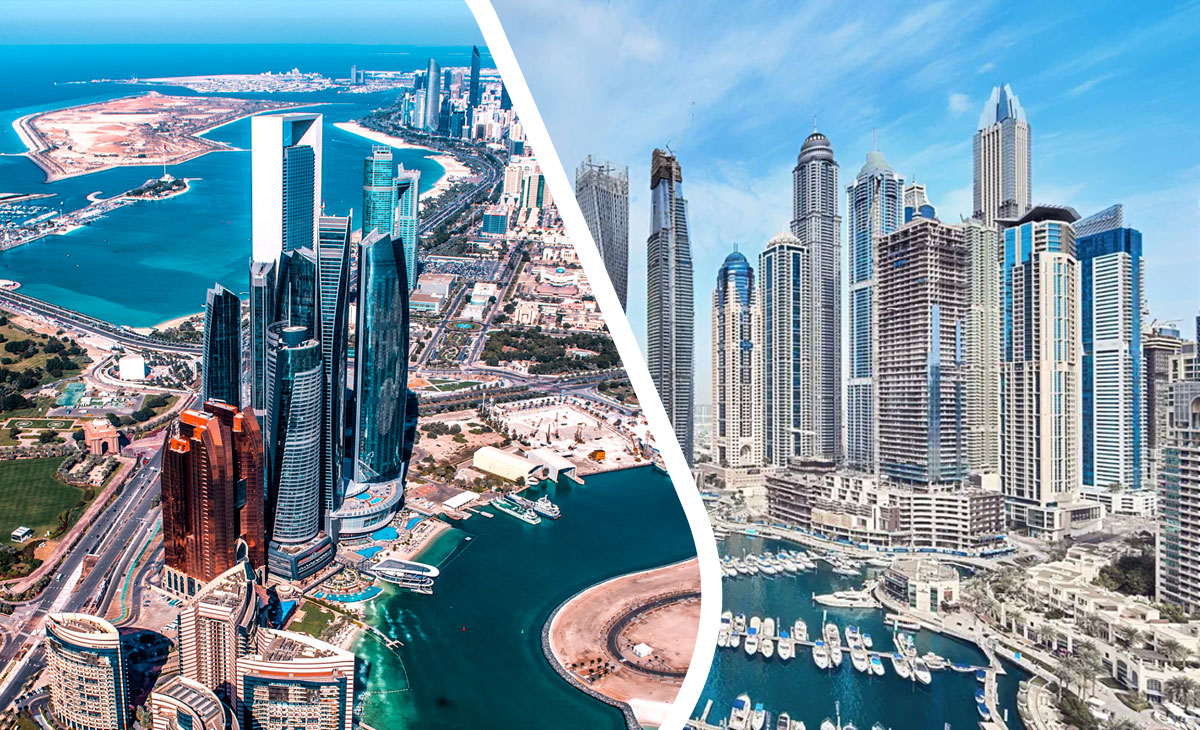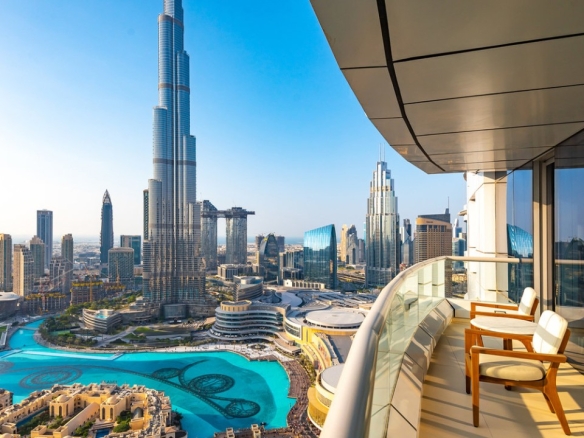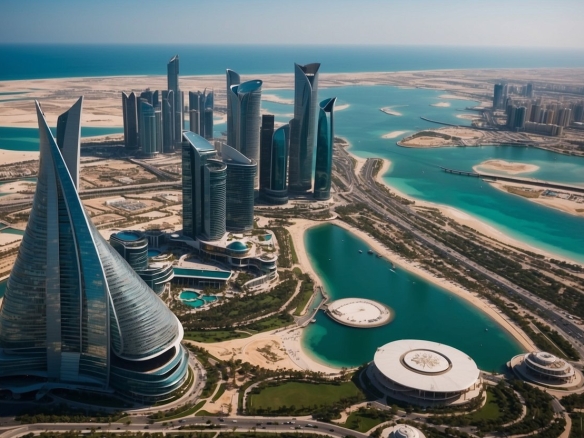Introduction to Property Investment in the UAE
The United Arab Emirates (UAE) has been a hotbed for property investments over the past few decades, largely thanks to its stable economy, strategic location, and innovative policies. Now, if you’re planning to dip your toes into the UAE’s real estate market, two cities probably top your list – Dubai and Abu Dhabi. Picture this, both cities offer futuristic infrastructure, high-quality lifestyles, and lucrative investment opportunities, yet they have their unique flavours.
Dubai, renowned for its iconic skyscrapers and glitzy lifestyle, has a vibrant property market that attracts international investors like bees to honey. On the other hand, Abu Dhabi, with its slightly laid-back vibe and cultural richness, provides an alternative investment landscape that’s equally enticing.
Choosing between these two cities is like deciding between a chocolate and a strawberry milkshake. Both are delightful, but your preference depends on your taste! The same goes for real estate investment – it all boils down to your investment objectives, financial resources, and personal preferences.
Understanding the Dubai Villa Market
Dubai’s villa market, much like the city itself, is dynamic and exciting. Despite global economic uncertainties, villa prices in Dubai have been on an upward trend recently. High demand and limited supply, especially in established neighbourhoods, are driving up prices.
What makes Dubai so appealing? Well, there are a few factors at play here. The city’s status as a global hub for business and tourism, coupled with a diverse population and tax-free regime, makes it an attractive prospect for investors. Plus, Dubai’s government policies are generally investor-friendly, with efforts to ease restrictions on foreign ownership and introduce long-term visas.
The cherry on top? The fantastic lifestyle Dubai offers – a perfect blend of luxury and comfort, with access to world-class amenities, recreational facilities, and a cosmopolitan environment that’s hard to resist. It’s like investing in a villa and getting a ticket to a life of glitz, glamour, and global connectivity!

Unveiling the Abu Dhabi Villa Market
Moving on to Abu Dhabi, the capital city of UAE, presents a slightly different picture. The villa market here has been somewhat stable, with modest fluctuations in prices. The real charm of Abu Dhabi lies in its capacity to offer an equally luxurious lifestyle as Dubai but with a touch of tranquillity and culture.
Abu Dhabi’s villa market has its unique selling points. The city’s strategic planning, focusing on sustainable development and cultural preservation, appeals to those seeking a balance between modern comforts and traditional values. Add to that, Abu Dhabi’s promising economic prospects and increasing global prominence make it a worthwhile investment destination.
Moreover, the government’s initiatives to attract foreign investment, such as granting long-term visas and allowing full foreign ownership in certain sectors, have boosted investor confidence. So, if you’re someone who enjoys serene beachfront living and a rich cultural vibe, investing in Abu Dhabi could be your cup of tea!
Comparing Investment in Dubai and Abu Dhabi Villas
Now, let’s put Dubai and Abu Dhabi head to head. When it comes to Return on Investment (ROI), Dubai might edge out slightly due to its higher rental yields, primarily driven by its appeal as a global tourism hotspot. However, Abu Dhabi is not far behind, offering competitive ROI, especially in sought-after neighbourhoods.
Market stability? Both cities demonstrate a good level of market stability, thanks to the UAE’s strong economy and proactive government policies. However, Dubai, with its more established market, might be seen as a safer bet by some investors.
When we talk about growth potential, it’s a close call. Dubai’s ambitious projects and constant strive for innovation signify strong growth potential. At the same time, Abu Dhabi’s sustainable development plans and initiatives to diversify its economy also indicate promising growth prospects.
The unique selling point for Dubai’s villa market lies in its blend of luxury, innovation, and global appeal, while Abu Dhabi stands out for its balanced lifestyle, cultural richness, and strategic growth plans.
Legal Aspects of Investing in Dubai and Abu Dhabi Villas
Before you take the plunge, it’s crucial to understand the legalities involved. In both Dubai and Abu Dhabi, foreign investors can fully own properties in designated areas known as “freehold” zones. Additionally, the UAE government has introduced long-term residency visas for property investors, further sweetening the deal.
However, the processes involved in purchasing a villa can differ slightly between the two cities. Generally, Dubai’s process is quite streamlined and well-documented, with transactions handled by the Dubai Land Department. In contrast, Abu Dhabi’s process, while equally secure, may seem less straightforward to some, primarily due to the involvement of multiple entities, including the Department of Municipalities and Transport and individual developers.
Remember, a knowledgeable local real estate agent can be your best friend in navigating these legal processes.
Expert Tips for Investing in Dubai or Abu Dhabi Villas
When it comes to choosing between Dubai and Abu Dhabi, here are some tips. Consider your investment goals – are you seeking higher rental yields, potential capital appreciation, or a second home? Your answer to this question can significantly guide your choice.
Do your homework. Research the neighbourhoods, market trends, future developments, and legal processes in both cities. Make use of available online tools and databases, such as property portals and official government websites, for accurate information.
Lastly, seek professional advice. Experienced real estate agents, financial advisors, and legal consultants can provide valuable insights and help you avoid common pitfalls. As the old saying goes, “Better safe than sorry!”
Case Studies of Successful Villa Investments in Dubai and Abu Dhabi
For a dash of inspiration, let’s take a look at some successful investment stories. In Dubai, an investor purchased a villa in the sought-after Palm Jumeirah area in 2010, at the height of the global financial crisis. Fast forward to today, the villa’s value has more than doubled, providing a handsome return on investment.
In cases? Be patient, have a long-term view, and take calculated risks. Remember, every cloud has a silver lining!

Factors to Consider When Choosing Between Abu Dhabi and Dubai Villas
A. Location and Accessibility
Abu Dhabi and Dubai, though both situated along the Arabian Gulf, have unique geographical features. Dubai, with its cosmopolitan hustle and bustle, is home to several world-class attractions like the Burj Khalifa and Palm Jumeirah. It’s a transport hub with excellent road, air, and sea connectivity.
Abu Dhabi, while more spread out and tranquil, is home to natural islands and cultural landmarks like the Sheikh Zayed Grand Mosque. Its airport serves as a gateway to the capital and connects to various global destinations.
B. Cost of Living
Living in either city is not exactly cheap, but the cost varies. Dubai, with its high-end lifestyle and exclusive amenities, can be more expensive. Abu Dhabi, while offering a similar quality of life, might be slightly more affordable, especially in terms of housing and utilities.
C. Career Opportunities
Both cities offer a plethora of opportunities across sectors like oil and gas, real estate, finance, and tourism. However, your choice might depend on your industry. For instance, if you’re into finance or international business, you might lean towards Dubai due to its status as a global business hub. On the other hand, if you’re in the oil and gas sector, Abu Dhabi could be a better fit.
D. Lifestyle and Preferences
Dubai is known for its vibrant social scene, endless entertainment options, and luxury retail outlets. If you’re someone who loves a fast-paced, cosmopolitan lifestyle, Dubai is your playground. In contrast, if you prefer a quieter, more laid-back lifestyle with a touch of culture and heritage, Abu Dhabi might be more up your alley.
E. Educational Facilities
Both cities host a range of high-quality educational institutions catering to various curricula. While Dubai’s education sector is more mature with a higher number of schools, Abu Dhabi is fast catching up, with significant investments in education.
F. Healthcare Services
Dubai and Abu Dhabi boast world-class healthcare facilities and services. However, the cost of healthcare can be relatively high in Dubai compared to Abu Dhabi. Both cities have mandatory health insurance policies, so it’s important to factor this into your decision.
The Economic Indicators
Impact of Economic Diversification on Property Markets
Dubai’s economic diversification strategy, particularly its focus on sectors like tourism, logistics, and finance, has positively influenced its property market, making it more resilient to global economic shocks. Meanwhile, Abu Dhabi’s efforts to reduce its dependence on oil and diversify its economy have led to new opportunities in sectors like culture, healthcare, and education, providing impetus to its real estate market.
Future Prospects Based on Economic Trends
With Expo 2020 and a host of other major events, Dubai’s economy is set for a significant boost, positively impacting the real estate market. Abu Dhabi’s Vision 2030 and its focus on a sustainable and knowledge-based economy signify promising prospects for its property market.
Lifestyle Factors Affecting Your Investment Decision
Cultural Lifestyle and Social Scene
Dubai’s cosmopolitan vibe, bustling nightlife, and foodie culture may attract those who enjoy a fast-paced, international lifestyle. Abu Dhabi’s blend of modernity and tradition, along with its flourishing arts scene, appeals to those seeking a cultural experience.
Amenities and Services: Dubai vs Abu Dhabi
Dubai stands out with its world-class infrastructure, luxury retail outlets, and state-of-the-art amenities. Abu Dhabi, while not as flashy as Dubai, doesn’t lag far behind, offering high-quality amenities, beautiful public spaces, and a growing number of retail and entertainment options.
Risks and Mitigation in Both Markets
Understanding and Managing Risks in Dubai
The Dubai property market, like any other, is not immune to risks. Factors such as oversupply, global economic conditions, and fluctuating oil prices can impact the market. Mitigation strategies include thorough market research, diversifying your investment portfolio, and seeking professional advice.
Navigating and Minimizing Risks in Abu Dhabi
Similar risks apply to Abu Dhabi, along with unique challenges like slower market maturity and dependency on government spending. Potential mitigation strategies include investing in established areas, keeping a long-term perspective, and staying informed about economic and policy developments.
Where is Your Money Better Invested – Dubai or Abu Dhabi Villas?
So, where should you park your money? The Dubai villa with the skyline view or the tranquil Abu Dhabi villa overlooking the turquoise sea? The choice, dear reader, is entirely yours.
Both cities offer lucrative investment opportunities, albeit with their distinct offerings. Dubai may appeal to those seeking higher returns and a fast-paced lifestyle, while Abu Dhabi could be a better fit for those desiring stability and a balanced lifestyle.
Investing in real estate is not just about figures and trends; it’s also about your preferences, goals, and lifestyle choices. So, do your homework, seek professional advice, and trust your instincts. After all, investing is as much a head game as it is a heart game.
Happy investing, and may the property gods be ever in your favour!
Frequently Asked Questions
1. Can foreigners own property in Dubai and Abu Dhabi?
Yes, foreigners can own property in specific areas known as ‘freehold’ areas in both Dubai and Abu Dhabi. In Dubai, these include areas like Palm Jumeirah, Downtown Dubai, and Dubai Marina, among others. In Abu Dhabi, designated investment zones like Al Reem Island, Yas Island, and Saadiyat Island allow foreign ownership.
2. How does the cost of living in Dubai compare to Abu Dhabi?
The cost of living can vary between Dubai and Abu Dhabi. While both cities offer a similar quality of life, living in Dubai might be slightly more expensive, especially in terms of housing and dining. Utilities, on the other hand, might be cheaper in Dubai compared to Abu Dhabi.
3. Which city offers a better ROI on villa investments, Dubai, or Abu Dhabi?
While both cities offer attractive investment opportunities, the ROI can depend on various factors, including the location of the villa, the type of property, and market conditions. In general, Dubai’s mature market might offer higher returns in the short term. However, Abu Dhabi, with its increasing economic diversification and stable market conditions, might offer sustainable returns in the long run.
4. Which city offers a more vibrant nightlife, Abu Dhabi or Dubai?
Ah, the eternal question of night owls! While both Abu Dhabi and Dubai offer a rich nightlife scene, Dubai tends to take the lead in this department. Dubai is known for its lively entertainment options, including world-class nightclubs, bars, and lounges that cater to all tastes and preferences. However, Abu Dhabi also has its share of sophisticated nightspots and exciting venues for those who enjoy a more laid-back yet elegant nightlife experience.
5. Are there any cultural differences between Abu Dhabi and Dubai?
Indeed, there are some subtle cultural differences between the two cities. Abu Dhabi is generally considered to be more conservative and traditional, deeply rooted in Emirati customs and heritage. Dubai, on the other hand, has embraced a more cosmopolitan and multicultural approach, attracting a diverse population from around the globe. However, both cities maintain high levels of respect for their cultural heritage and promote a tolerant and inclusive environment.
6. Which city has better shopping options, Abu Dhabi or Dubai?
If shopping is your passion, Dubai is the ultimate paradise for retail therapy enthusiasts. The city is renowned for its vast array of shopping malls, including the iconic Dubai Mall and Mall of the Emirates, where you can find luxury brands, high-street fashion, and everything in between. On the other hand, Abu Dhabi offers a more refined and exclusive shopping experience with luxurious boutiques and designer stores scattered throughout the city.
Investing in the real estate market, like any investment, comes with its risks and rewards. It’s essential to conduct thorough research, understand market conditions, and seek professional advice to make informed decisions.




Join The Discussion